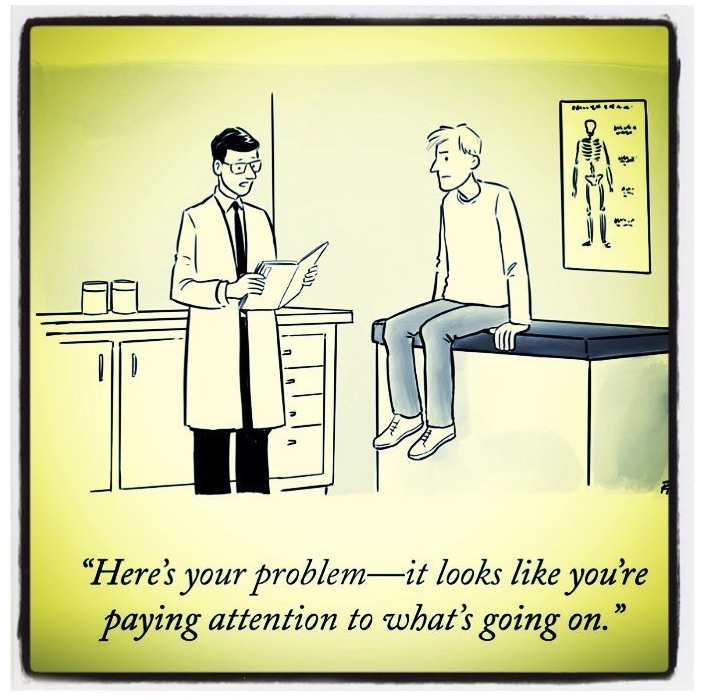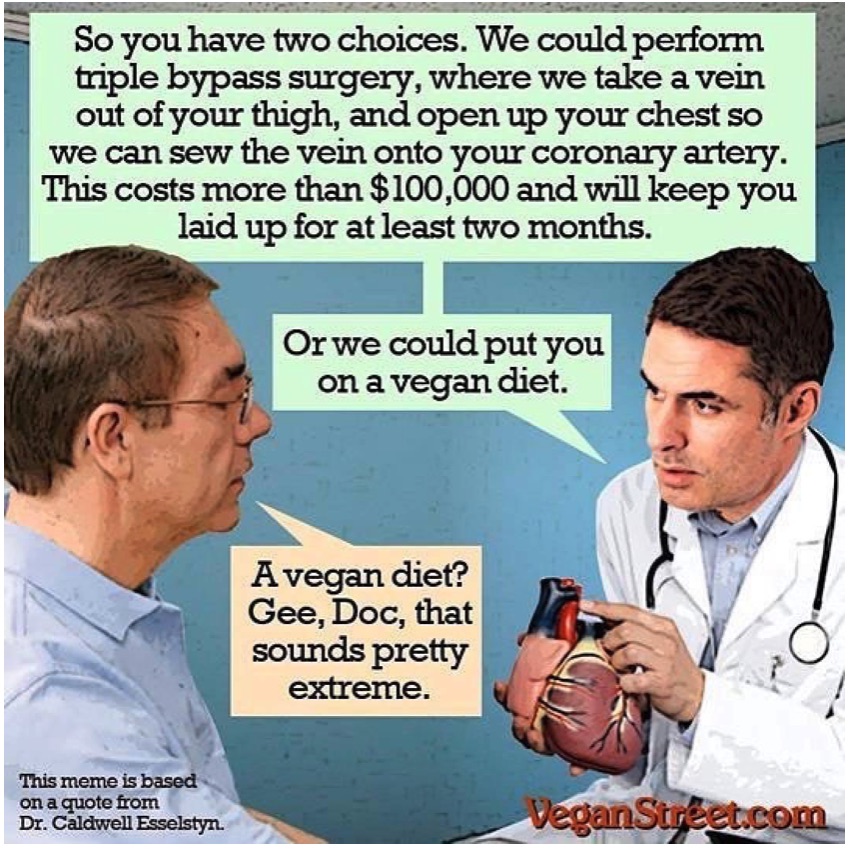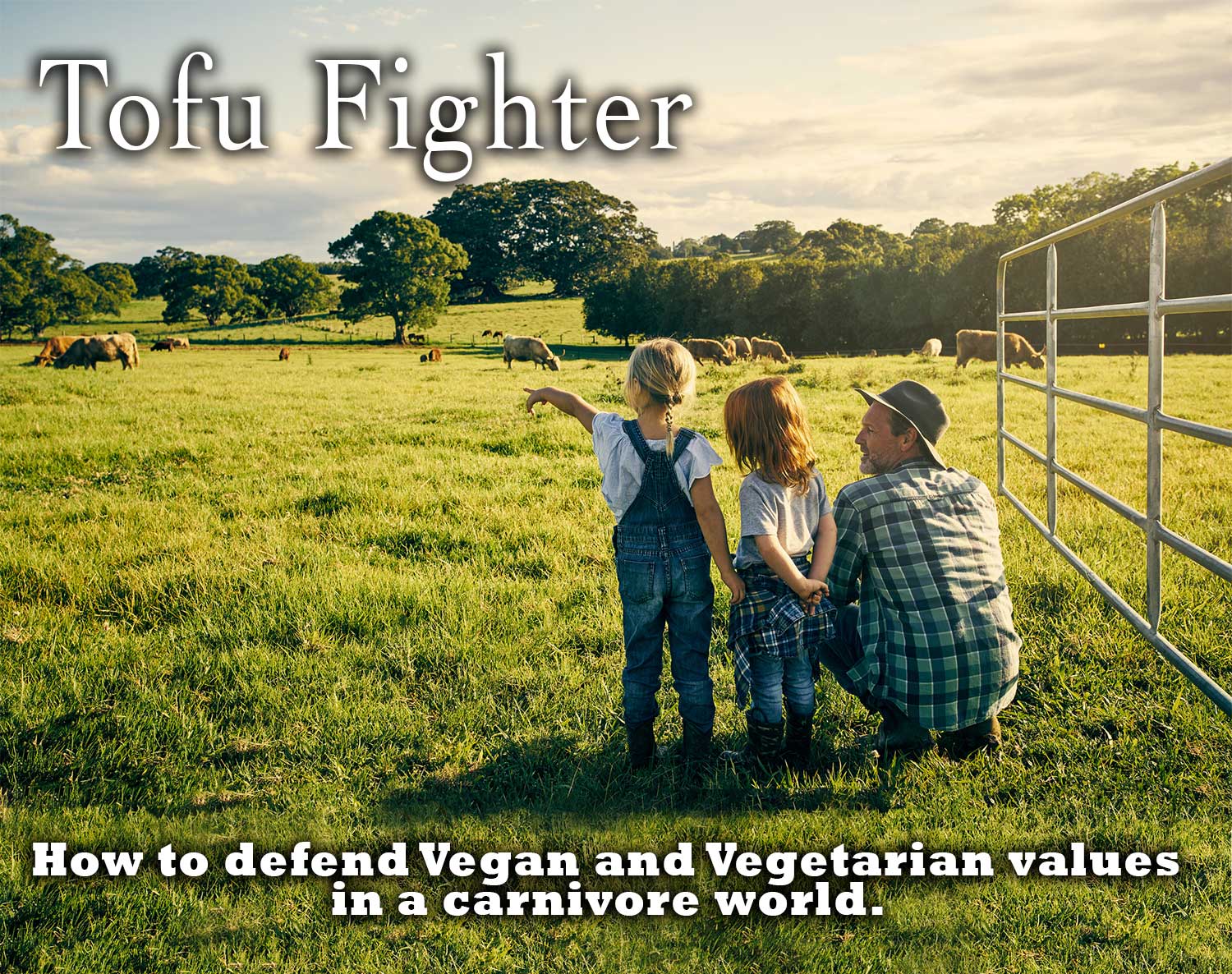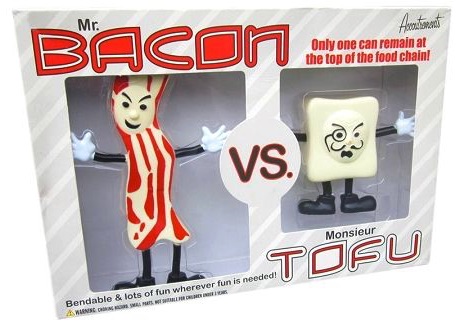
What to say, how to say it.
(Feel free to copy and paste)
________________
“But I need animal Protein!”
ALL essential protein comes from plants.
Optimal protein intake can be sourced entirely from plants. Beef and chicken, often praised for their protein content, derive it from the plants they consume. Essentially, animal protein is a recycled form of plant protein. Contrary to common belief, excessive protein intake is a prevalent issue, with many individuals surpassing their needs.
The term "protein" has transformed into a marketing buzzword, fostering misconceptions about dietary requirements. A well-rounded diet comprising various plant-based foods ensures an ample supply of protein. Adults typically require 30-50 grams of protein daily, a quantity easily met by consuming diverse plant-based options, such as a serving of brown rice.
Remarkably, vegan athletes debunk the myth that animal products are essential for peak performance. Renowned figures like tennis champions Novak Djokovic, Serena and Venus Williams, quarterback Tom Brady, boxer David Haye, bodybuilder Barny du Plessis, snowboarder Hannah Teter, and surfer Tia Blanco exemplify the success of a plant-based lifestyle in achieving athletic excellence.
"But animal Protein is better than plant Protein "
The notion that animal consumption somehow enhances the quality of plant protein lacks scientific support. There are 20 amino acids crucial for protein synthesis, with our bodies naturally producing 11. The remaining 9, termed essential amino acids, originate from plants. While animal products offer these amino acids in a concentrated form known as complete protein, it comes at a cost. Animal protein is linked to cholesterol, drug-resistant viruses, animal cruelty, environmental damage, and greenhouse gas emissions. A more sustainable and ethical approach involves obtaining all essential amino acids through a diverse plant-based diet.
Beyond traditional sources, plant-based foods like soy, quinoa, and buckwheat provide complete proteins containing all 9 essential amino acids, eliminating the need for animal products.
Contrary to misconceptions, some of the largest and most robust animals on Earth, such as elephants, bison, gorillas, rhinos, horses, cows, giraffes, camels, and bulls, are herbivores, thriving on a plant-based diet that fulfills their protein and strength requirements.
Even the term "horsepower," used to measure engine power, is derived from an animal—horses—that thrives without consuming meat. This serves as a compelling reminder that strength and vitality can be achieved without relying on animal-based protein sources.
“It’s too hard to give up meat.”
Have you ever known someone who has endured the challenges of a heart attack or stroke? The physical and financial toll is substantial, with the average cost of a bypass operation reaching $150,000 (USD) and a recovery period that keeps individuals out of work for six weeks or more.
In our family, we've embraced a shift toward plant-based alternatives, opting for "chicken, beef, or fish" substitutes that are not only delicious but also provide a nutritionally rich and cost-effective option.
Transitioning gradually, one meal at a time, makes the process remarkably manageable. You'll find that the adjustment is surprisingly easy, and over time, the transition becomes a seamless and sustainable part of your lifestyle. The benefits extend beyond personal health, reaching into the realm of affordability and culinary delight.
"It’s too expensive"
Plant-based foods have become significantly more economical when compared to their animal product counterparts. When factoring in both health-related expenses and the environmental impact associated with meat consumption, the financial benefits of opting for plant-based options become even more pronounced. In essence, choosing plant-based foods not only aligns with cost-effectiveness but also promotes a healthier lifestyle and contributes to reducing environmental damage.
“I’ve always eaten meat, I always will.”
Traditions, once ingrained, can be profoundly harmful. Slavery, the denial of women's voting rights, and the once-perceived allure of smoking are all examples. As a species, we are evolving, shedding outdated habits that no longer contribute positively to our well-being.
Consider this:
COVID originated from animals.
Heart disease usually stems from the consumption of animal products.
In the trajectory of our evolution, our food choices play a pivotal role. It's a reminder that our decisions today can shape a healthier and more compassionate future.
“But I can’t give up bacon!”
Bacon has earned the dubious distinction of being classified as Group 1 carcinogenic by the World Health Organization, joining the ranks of smoking, arsenic, pesticides, and other processed meats.
The environmental toll of bacon production is equally concerning. On factory farms, vast lagoons store pig feces, a practice that frequently results in leaks contaminating rivers and harming aquatic life. Additionally, the airborne dispersion of pig feces, often used as a disposal method, raises health concerns for local communities.
Adding another layer to the ethical considerations, pigs have been scientifically proven to display higher intelligence levels than dogs. This compels us to reflect not only on the health risks but also on the moral implications of our food choices.
"One size fits all diets don’t work"
Smoking is bad for everyone. Heroine is bad for everyone. One size does fit this.
"The Bible says that Man has dominion over all animals."
Upon their birth, the fate of most male chicks is a gruesome one—they are tossed into a macerator, a device resembling a blender, and swiftly chopped up. Being non-layers and too bony for consumption, these male chickens are deemed by-products and discarded without a second thought.
Pigs endure a similar fate, often subjected to tail amputations and castrations performed without anesthesia. This stark reality illustrates the unsettling portrait of human dominion over animals.
Globally, over 50 billion animals meet their end each year:
- 136 million per day
- 6 million per hour
- 100,000 per minute
- 1600 every second
These staggering numbers compel us to confront the magnitude of our impact on the lives of countless beings, urging a deeper reflection on the ethics of our treatment towards animals.
There is an Australian film called “Dominion” which is available for free on YouTube. It shows the real lives of these animals. From birth to plate.
“My doctor hasn't recommended it”
Numerous doctors may not receive extensive training in nutrition, potentially limiting their awareness of its benefits.
The demanding workload of doctors sometimes leads them to prioritize patient preferences over their actual healthcare needs.
A concerning trend emerges as some doctors become affiliated with corporations focused on profit maximization. In this scenario, businesses thrive on having customers, and unfortunately, individuals dealing with health issues become a profitable customer base.
"My family has a history of heart disease. I can’t avoid it."
If your family has a history of meat consumption, it doesn't necessarily prove its inevitability. Notably, vegans tend to exhibit significantly lower cholesterol levels compared to carnivores. This lower cholesterol translates to a reduced risk of heart disease and stroke, highlighting the potential health benefits of adopting a plant-based diet.
"But I hear soy has hormone issues."
While some older studies have suggested that consuming substantial amounts of soy might be linked to minor hormonal issues, ongoing research is still in progress. It's important to note that soy is just one among numerous nutritional sources for vegans, and its intake can be easily moderated or replaced with alternative options. Keep in mind that the scientific understanding of soy's effects is evolving, and a varied plant-based diet provides a wealth of nutrition without relying solely on one specific source.
"A vegan diet is missing the B12 vitamin"
Yes that's true, but several plant-based milks like soy and almond, among other plant-based products, are fortified with B12. By incorporating these items into a well-balanced diet, one can ensure sufficient nutritional intake. Regular consultations with a doctor and annual B12 level checks are advisable for comprehensive health monitoring.
It's worth noting that farm animals are frequently administered B12 vitamins to supplement their diets, emphasizing the interconnectedness of dietary practices and nutritional considerations across various lifestyles.
“I've seen Vegans cheat and eat meat...”
It's not uncommon for vegans and vegetarians to occasionally deviate from their dietary choices, influenced by social or family pressures. We are all human, prone to lapses and mistakes. However, even with minor efforts, significant improvements can still be achieved in terms of personal health, environmental impact, and the well-being of animals. Each small step toward a plant-based lifestyle contributes to positive change.
“Substitutes just don’t taste the same”
Have you experienced the culinary wonders of the Impossible Burger, Beyond Burger, Just Egg, Vegi-naise, Gardein, or So-Delicious? These innovative products are truly remarkable, and I encourage you to give them a try.
Not only do they offer a delightful taste, but opting for these alternatives allows you to enjoy virtually the same product with significantly less fat and a reduced environmental impact. It's a win-win for your palate and the planet.
“but fake meats are heavily processed foods and not any healthier than meat and more expensive”
While some of the new plant-based products undergo processing during manufacturing, it's a facet that requires ongoing study. Nevertheless, this processing pales in comparison to the detrimental effects associated with processing plant protein through animals, which includes the generation of cholesterol, drug-resistant viruses, animal cruelty, environmental damage, and greenhouse gas emissions.
When examining all metrics of the Impossible Burger collectively, a compelling narrative emerges. With 19 grams of protein, 0 cholesterol, 0 antibiotics, and 0 fecal contamination (E-coli, Salmonella, etc.), it boasts impressive environmental sustainability: 75% less water usage, an estimated 87% reduction in greenhouse gases, and a staggering 95% less land use. To put it in perspective, it takes 16 pounds of vegetables to produce 1 pound of meat, and the average meat hamburger involves the lives of 12 cows.
Adding to the appeal, the Impossible Whopper is only marginally more expensive than its traditional meat counterpart. When considering the true cost of meat, factoring in environmental damage, farm subsidies, and health issues, plant-based options emerge as significantly more cost-effective. Additionally, as plant-based industries continue to scale up, it is anticipated that prices will become even more affordable in the future.
“But don’t you need to take Supplements to be vegan?”
A plant-based diet inherently provides all the essential nutrients, and contemporary plant-based products are often enriched with vitamins. However, if you find yourself lacking any essential vitamins, consulting with a doctor and considering supplementation is always an option. Notably, many alternative milk products are fortified with the same essential vitamins as traditional cow's milk, ensuring a well-rounded nutritional intake.
“It’s just more vegan propaganda”
Indeed, everything can be considered a form of propaganda. Campaigns against smoking, promotion of seatbelt and motorcycle helmet use, and warnings about asbestos—all of these can be seen as propagandistic efforts that, collectively, have contributed to enhancing our safety and well-being.
“Humans have always eaten meat”
While it's true that cavemen likely relied on meat for survival due to the limited options available, our circumstances today have evolved significantly. Unlike our ancestors, we are not constrained to a hunter-gatherer lifestyle. With a plethora of choices available, consuming animals has become unnecessary. We now have the privilege of exploring a diverse array of plant-based options that provide ample nutrition without the need for animal products.
“Veganism hurts farmers”
Farmers truly form the backbone of our world, investing tireless efforts daily, often surpassing what most of us accomplish in an entire week. However, akin to tobacco farmers of the past, they find themselves cultivating a product that is no longer sustainable. The environmental repercussions and health issues associated with meat production have reached untenable levels, while the cruelty inflicted upon animals is morally indefensible.
Recognizing farmers as dedicated businessmen and businesswomen, we owe them our respect and support during this pivotal period of transformation. As stewards of the land passed down through generations, they face the challenge of reevaluating their crops for the future. It's time to collectively encourage and assist them in transitioning toward more sustainable, compassionate, and forward-looking agricultural practices.
“Well, we’re all gonna die anyway.”
Have you brushed your teeth this morning, worn a seatbelt, exercised, or remembered to turn off the stove?
Despite the inevitability of mortality, we make daily choices to enhance our well-being. Among these choices, what you put into your mouth holds profound significance.
Consider this: if illness strikes, who bears the financial burden? Health insurance, right? Well, in reality, we all share the cost. Making conscious dietary choices not only impacts your personal health but also contributes to the collective responsibility we all share for the well-being of our community.
“All things in moderation.”
Is smoking or using heroin in moderation considered healthy, or is it inherently unhealthy?
“Eating meat is my personal choice”
While it is undoubtedly a personal choice, it's essential to recognize that such choices extend beyond the individual and impact all of us. The collective consequences encompass the costs of healthcare, the exacerbation of climate change, and the toll on the environment.
“Why do humans have canine teeth like carnivores in the wild then? ”
Our human teeth diverge significantly from the sharp, long front teeth of carnivores in the wild, such as lions, tigers, and bears, which are adapted for tearing into meat.
An intriguing point worth considering is that the majority of adult choking deaths occur during meat consumption. This observation raises questions about our inherent suitability as carnivores, suggesting that our anatomy might not align with a carnivorous dietary design.
“Local organic meat is still better than vegetables bought from other places”
The resource disparity is staggering: it requires 16 pounds of vegetables to produce just 1 pound of beef, and the water consumption for the same quantity of beef is a whopping 50 times greater than that for plant-based alternatives. The environmental impact of meat production surpasses that of plant cultivation significantly.
Moreover, the risks associated with animal agriculture are substantial, with links to diseases like Mad Cow, E. Coli, Salmonella, and antibiotic-resistant diseases. These facts underscore the multifaceted consequences of the meat industry on both the environment and public health.
"But I only buy cage free and free range meat"
There is not a better way to do a wrong thing. Engaging in an ethically questionable action lacks an inherently superior approach. When it comes to ending the life of an unwilling creature, there's no humane method. While certain techniques might provide a sense of moral comfort, the actual enhancement in the lives of the animals remains minimal.
"But lettuce and other vegetables have been making people sick too..."
Certainly, the leading cause of short-term foodborne illnesses in the USA currently involves leafy vegetables and sprouts, with meat closely following. Typically, the root of the problem lies in bacterial contaminants such as E. Coli or Salmonella, which originate from fecal matter, usually animal-derived. The challenge arises from the vast quantities of waste generated in the process of raising animals for food. Managing and preventing this waste from contaminating the water supply is an intricate challenge.
As the demand for meat has surged, foodborne outbreaks have tripled in the last two decades, and the unmistakable correlation to animal agriculture raises concerns that cannot be ignored. The implications of these trends underscore the urgent need for a comprehensive examination of our food production systems.


How to change hearts and minds.
_______________
Create peace
Food is deeply personal, often evoking strong emotions. Discussions about veganism can spark heated debates, sometimes turning contentious. Amidst these arguments, it's crucial to stay grounded in your identity and purpose. Remember that those opposing your views might simply be uninformed individuals. Even when faced with unkindness, choose to ignore the anger and respond with love. Maintain kindness, practice patience, and don't forget to take a deep breath. In the end, fostering understanding often yields more meaningful conversations than engaging in heated disputes.
______________________
It’s the science stupid
The most potent weapon at our disposal is unquestionably science. Rely on facts and well-conducted studies, as anecdotal evidence does not constitute proof. Your personal sense of improved health, while valid for you, doesn't equate to scientific evidence. Seek information from peer-reviewed studies, not just social media posts. When delving into scientific research, remain open-minded, even if the findings don't align with our preconceived notions. Always scrutinize the funding sources behind studies, especially considering the significant influence of multi-billion dollar agro-corporations. They possess the capability to shape their own science to suit their interests, often perpetuating misinformation against vegan ideals. Stay vigilant, arm yourself with facts, acknowledge the unknowns, and establish a solid foundation based on science—the key to mastery and success in the ongoing discourse.
_______________________
Know your enemy (who’s not your enemy)
Mom's Thanksgiving turkey and Grandma's meatloaf evoke powerful memories; food embodies tradition, family, and history. Meat is deeply interwoven into these aspects of our lives. Acknowledging the resistance to change, it's challenging for many to perceive the environmental and ethical implications of meat consumption. To facilitate understanding, step into their shoes, empathize with their perspective, and gently nudge them toward awareness. Utilize a combination of persuasion, leveraging shared values, education, and the power to inspire change. Recognizing the emotional ties to food allows for a more compassionate and effective approach in fostering awareness and promoting positive shifts in dietary choices.
____________________
Know your Cholesterol score
When faced with the doctor's prescription for cholesterol medication due to elevated levels, it's often viewed as a convenient solution to mitigate the consequences of unhealthy choices. In these moments, consider sharing your own cholesterol score and, if applicable, the absence of any medication. Showcase alternative approaches, fostering a dialogue that encourages healthier lifestyle choices as a more sustainable and proactive means to address such concerns. By sharing personal experiences and alternatives, you may inspire others to explore holistic health strategies and reconsider the reliance on medication alone.
_____________
Fight or flight
Food and politics, though distinct, share a kinship that often requires the wisdom to discern when to engage and when to step back. Mastering this delicate balance involves recognizing when to stand your ground and when it's more prudent to disengage. Conversing with someone who isn't receptive may not be the most productive use of your time. The path of a master involves strategic choices, knowing when to invest energy in meaningful discussions and when to preserve it for endeavors that yield greater impact.
Pick your battles and you can help change the world.
____________________
Focus your fight
The debates around gluten-free diets, organics, and GMOs are indeed worthwhile, but it's advisable to avoid conflating these discussions with the topic of veganism. Each of these issues stands on its own merit, rooted in distinct facts, topics, and scientific considerations. Keeping these discussions separate allows for a more focused and nuanced exploration of each subject, preventing confusion and facilitating a more meaningful dialogue.
Fight one battle at a time.
___________________
The moral fight
Navigating a world lacking compassion, especially concerning the mistreatment of animals, can be emotionally challenging. It's disheartening to witness the indifference that prevails. For those who care deeply, the burden often leads to feelings of isolation and alienation.
In such a world, it's crucial to remember that light begets more light. Be a beacon of compassion, and rally behind groups and individuals who share this illuminating spirit. While compassion might not triumph in every battle, it is undeniably the force that will ultimately win the war. Stay committed, and your compassionate endeavors will contribute to a brighter, more empathetic world.
________________
Don’t be smug
Being labeled as "smug" or "holier than thou" can be genuinely hurtful. However, it's crucial to acknowledge that, at times, these labels are earned through our attitudes and ineffective debating skills. In discussions, redirect the focus towards personal experiences, emphasizing how the choices you make impact you and your family. Opt for statements like, "I choose this for myself because..." or "Our family follows a different path because..." instead of adopting a prescriptive tone with statements like "You should be doing this..." or "You're wrong because...". While passion is valuable, expressing it in a more constructive and empathetic manner enhances the effectiveness of your communication.
________________
Keep it simple
Avoid delivering lectures or lengthy speeches in debates; instead, provide concise and focused responses. Keep your points succinct and to the point to maintain engagement and effectively convey your perspective.
Masters fight with less.
___________________
Change your words
Opt for terms like "plant-based," "sustainable," or "green foods" instead of using loaded words like "Vegan" and "Vegetarian." Shifting the language can transform a potential argument into an open and constructive conversation.
_____________________
We could be wrong
Acknowledging our limitations is challenging but essential. We aren't always experts in environmental science, nutrition, veterinary care, or professional debate. Scientific understanding can evolve, and it's crucial to remain open and humble, adapting to new information. Embrace a continuous questioning of the science, be willing to admit when you're wrong, and persist in advocating for what has been unequivocally proven.






